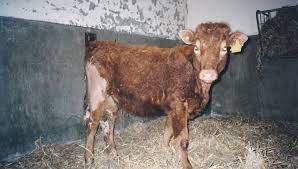Bovine Viral Diarrhoea:

Scientists have recently created the first gene-edited calf with resistance to the bovine viral diarrhoea virus (BVDV).
- Bovine Viral Diarrhoea (BVD) is an infectious disease, globally distributed endemic to cattle and other ruminant populations.
- It is caused by the Bovine Viral Diarrhea Virus (BVDV).
- It can cause of respiratory and reproductive issues in the herd.
- It leads to immunosuppression and can cause signs in multiple body systems in addition to the digestive tract.
- Most animals become exposed through contact with other recently infected or persistently infected (carrier) animals that are shedding the virus.
- It is also possible for cattle to become infected via contact with contaminated fomites, such as water buckets, calf feeders, feed bunks, IV equipment etc.
- It can be transmitted through a congenital infection of the fetus or after birth.
- The BVD infection in these calves will persist during the entire life of the calf, and they will shed BVDV continuously in the farm environment.
- While this virus has no cure, practising supportive therapies will temporarily help to improve the well-being of the cattle.
- Infected calves should be culled to prevent the spread of BVD.




